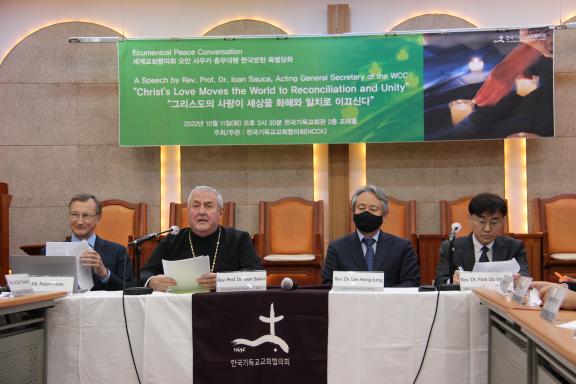Sauca expressed how grateful he is for the strong support and prayers of churches in Korea, which sent many people to the assembly. “I also wish to thank the WCC member churches in Korea and the National Council of Churches in Korea for their faithful commitment for the WCC’s Pilgrimage of Justice and Peace,” he said. “This has become our ecumenical paradigm since the WCC 10th Assembly in Busan, South Korea, engaging churches and partners in a common journey.”
The image of pilgrimage speaks to the identity of the ecumenical fellowship, said Sauca. “We are a movement and not a static institution,” he said. “As the WCC assembly gathered in Karlsruhe this year, we were conscious of the global manifestations of war, death, disease, violence, and famine in the world today.”
Yet there is joy as Christ’s invitation remains open to everyone, he continued. “In this regard, today, as we have gathered for an Ecumenical Peace Conversation, I want to highlight three key points and lessons that we learned together from the recent WCC 11th Assembly in Karlsruhe,” he said. “First, the WCC 11th Assembly has become a decisive turning point in our ecumenical journey, advocating for the integrity of God’s creation and for climate justice.”

WCC acting general secretary Rev. Prof. Dr Ioan Sauca delivering a keynote adress at the Ecumenical Peace Conversation in Seoul, South Korea, 11 October 2022.
Second, he said, the assembly theme guided the delegates and participants to take seriously the call for unity in Christ and to live as people of Christ’s reconciliation. “This assembly took place in the midst of war afflicting not only Europe but the entire world,” he said. “We gathered in prayers for peace in Ukraine, by condemning the war, denouncing violence as a solution to conflict, calling for the protection of innocent and vulnerable people, maintaining contact and dialogue with the churches in Russia and Ukraine, engaging churches from the neighbouring countries in round-table dialogue, and advocating for humanitarian assistance.”
Third, Sauca highlighted the ecumenical efforts and activities for peace and reunification on the Korean Peninsula. “During the period after Busan, churches and their specialized ministries have been even more deeply involved in formulating, planning, and fulfilling the initiatives and activities of the WCC,” he said. “Such is the case with the WCC’s persistent engagement during this period with issues of peace on the Korean Peninsula.”
Sauca was welcomed by Rev. Dr Chang Sang, former WCC Asia president, and by Rev. Dr Lee Hong Jung, general secretary of the National Council of Churches in Korea. A prayer of thanksgiving was offered by His Eminence the Most Rev. Metropolitan Ambrosios (Zographos) of Korea.

Participants of the Ecumenical Peace Conversation in Seoul, South Korea, 11 October 2022.
Rev. Prof. Dr Ioan Sauca expressed his gratitude that the WCC 11th Assembly adopted a Minute on “Ending the War and Building Peace on the Korean Peninsula.” The Minute renews the mandate of the WCC 10th Assembly in Busan, and draws the attention of the worldwide ecumenical movement to the ongoing search for peace, reconciliation and reunification of the divided Korean people and invites participation in the Sunday of Prayer for the Peaceful Reunification on the Korean Peninsula, the Ecumenical Forum for Peace, Reunification and Cooperation on the Korean Peninsula (EFK), and the Korea Peace Appeal Campaign.
In his greetings to the conference, Rev. Hong-Jung Lee, NCCK general secretary, expressed his gratitude to the World Council of Churches for its faithful pilgrimage of justice and peace with the people and churches in Korea.
“The main subjects of peace-building are us, ‘we the people,’ who live on the democratic values of sovereignty resting with people. The crucial key points are the people’s consciousness of peace-sovereignty, and our will for building peace-alliance in solidarity with love and justice.
People’s power must be our strategy for building peace on the Korean Peninsula. This”, said Lee, “is the key lesson that I learned from the WCC 11th Assembly in Karlsruhe.”
The WCC 11th Assembly has been an opportunity to harvest the lessons learned from the ecumenical Pilgrimage of Justice and Peace declared in Busan, noted Peter Prove, director of the WCC’s Commission of the Churches on International Affairs.
“The Minute adopted in Karlsruhe on building peace on the Korean Peninsula renews the invitation made in Busan for members of the global ecumenical fellowship to accompany and support the churches and people of Korea in their continuing search for peace, reunification and reconciliation”, said Prove. “It is especially timely as we approach the 70th anniversary of the 1953 Armistice Agreement next year – an occasion to strengthen appeals for an end to the Korean War and to replace the Armistice Agreement with a permanent peace treaty.”
Greetings message by Rev. Hong-Jung Lee, NCCK general secretary at the Ecumenical Peace Conversation
WCC acting general secretary visits Korean Peninsula (WCC news, 10 October 2022)







